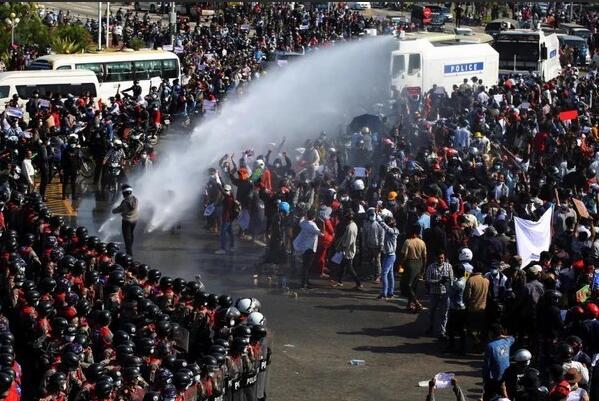(单词翻译:单击)
听力文本
Myanmar over the weekend saw its most violent day since the coup on February 1. That's the day when the military, which is always powerful, deposed the country's civilian leader, Aung San Suu Kyi. The United Nations says that at least 18 people were killed throughout the country on Sunday. Police opened fire on protesters, who've taken to the streets multiple times since the coup. Hundreds of people were also detained over the weekend. Reporter Michael Sullivan has been following events in Myanmar, and he's now on the line from nearby Thailand. Hey there, Michael.
MICHAEL SULLIVAN, BYLINE: Hi, Steve.
INSKEEP: What kind of news is coming out of Myanmar today?
SULLIVAN: Today, things seem to be a lot more quiet than they were yesterday. The protesters are back, but they're back in smaller numbers, though the police are still out in force. So far, there have been no reports of serious violence, unlike yesterday, which was really grim. I mean, we saw videos coming out pretty early in the morning of the police and, in some cases, soldiers coming after the protesters hard not just in Yangon but in the second city, Mandalay, and many other cities and towns all over the country. And the message was clear. We've been restrained up until now, but that's over.
INSKEEP: And just, of course, we're working on fragmentary evidence here. It's what you see in a video rather than being an eyewitness account necessarily. But based on those videos, what do these protests look like? Are these large crowds of people? Were they confronted by overwhelming numbers of police? What did it look like on the streets based on those videos?
SULLIVAN: There are huge numbers of people on the streets, but the protesters really aren't very well-prepared to meet a very well-armed and well-protected riot police, right? And that's basically what happens. You see a sea of protesters. Then you see the police wade into that sea with tear gas, with rubber bullets and with live ammunition.

INSKEEP: Well, what can the — what, if anything, could restrain the military at this point, which has now held power once again for about a month?
SULLIVAN: Honestly, I'd say very little. In the absence of any concerted, coordinated effort by the international community, the military will probably do what it's done before when confronted with widespread civil unrest in 1988 and 2007. And that's kill people until the problem goes away. The Biden administration has imposed targeted sanctions on the military leaders. And after yesterday's violence, National Security Adviser Jake Sullivan said there would be additional actions to impose further costs on those responsible for yesterday's violence and the coup. But unless the U.S. can get its regional allies on board — and Japan and Singapore are two that come to mind, some of the biggest investors in Myanmar, yeah? — that complicates things. Until that happens or unless that happens, Myanmar's military isn't going anywhere. It hasn't been afraid of sanctions in the past. I think it's highly unlikely they will be now.
INSKEEP: Do the protesters seem in any way intimidated by the show of force yesterday?
SULLIVAN: They might have been a little shocked by the show of force yesterday, but I think they're not going to let up. And that's part of the problem — yeah? — in terms of a peaceful resolution because there doesn't seem to be any room for compromise. The military isn't going to suddenly cave in and say, right, our bad. Here's your government back. And the protesters say they'll accept nothing less. There's a foreign ministers meeting tomorrow of the Association of Southeast Asian Countries, or ASEAN, to discuss it. Maybe they can come up with something. But I think that's a big ask.
INSKEEP: Very briefly, where's Aung San Suu Kyi?
SULLIVAN: She was seen in court in a video link today. She was brought up on a third charge. The first two came last week and the week before. So it's clear that the military is trying to figure out ways it can convict her of something, Steve, so she can't run again for public office if and when this thing gets sorted.
INSKEEP: Reporter Michael Sullivan, thanks for the update.
SULLIVAN: You're welcome, Steve.
中文翻译
参考译文:
上周末,缅甸经历了自2月1日政变以来最暴力的一天。2月1日,一向强大的军方废黜了该国文职领导人昂山素季。联合国表示,上周日缅甸全国至少有18人死亡。因为警方向抗议者开了火,而自政变发生以来,抗议者已数次走上街头。上周末还有数百人被拘留。记者迈克尔·沙利文一直在关注缅甸的事件,现在他将从邻国泰国和我们连线。你好,迈克尔。
迈克尔·沙利文连线:你好,史蒂夫。
因斯基普:缅甸今天有什么新闻?
沙利文:今天似乎比昨天要安静得多。抗议者再次走上街头,但参与人数有所减少,不过警察仍然出动了。到目前为止,还没有涉及严重暴力的报道,这与昨天相当严峻的情况不同。我们在清晨看到的视频显示,警察在仰光和缅甸第二大城市曼德勒以及全国各地的其他城市和城镇紧追抗议者,在某些情况下,甚至有士兵参与其中。这一信息非常清楚。在此之前,我们一直受限,但这种情况已经结束了。
因斯基普:当然,我们正在研究零碎的证据。这是你在视频中看到的,并不是目击者的叙述。但根据这些视频,抗议活动的情况如何?抗议人数多吗?抗议者面对的是人数众多的警察吗?从视频来看,街上是什么情况?
沙利文:街上有很多人,但是抗议者确实没有准备好应对装备精良且防护得当的防暴警察,对吧?基本情况就是这样。街上有大量抗议者。之后你会看到警察用催泪瓦斯、橡皮子弹和实弹攻击人群。
因斯基普:那是否可以约束军队?现在军方已经再次掌权一个月的时间。
沙利文:实话的话,我会说几乎不能约束军队。在国际社会没有任何协调一致的努力的情况下,军方很可能会采取与1988年和2007年面临广泛内乱时相同的做法。即杀人,直到问题消失。拜登政府对缅甸军方领导人实施了有针对性的制裁。而在昨天的暴力事件之后,美国国家安全顾问杰克·沙利文表示,美国将采取更多行动,让应对昨天的暴力事件和政变负责的人付出更多代价。但前提是美国能让其地区盟友参与进来,我想到的两个国家是日本和新加坡,他们是缅甸最大的投资者,对吧?这样才会使事态复杂化。在那之前或者除非这能实现,不然缅甸军队不会收敛。过去,缅甸军方并不害怕制裁。我认为他们现在也极不可能害怕。
因斯基普:昨天的“武力表演”有没有让抗议者感到害怕?
沙利文:他们可能对昨天的武力表演有点震惊,但我想他们不会放弃。这就是问题的一部分,对吧?因为似乎没有任何妥协的余地。军方不会突然屈服,并承认“对,我们的错”。你们的政府会回来。而抗议者也表示,他们不会妥协。明天,东南亚国家联盟(简称ASEAN)将举行外长会议讨论此事。也许他们能想出解决方法。但我认为难度非常大。
因斯基普:还有个小问题,昂山素季在哪里?
沙利文:她今大以视频连接方式出庭她被加控了第三项罪名。前两项罪名在上周和上上周提出。很明显,军方正试图找出判她有罪的方法,史蒂夫,这样一来,如果事情得以解决,她就不能再竞选公职。
因斯基普:以上是记者迈克尔·沙利文带来的报道 ,谢谢你报道的最新进展。
沙利文:不客气,史蒂夫。
译文属可可原创,仅供学习交流使用,未经许可请勿转载
重点讲解
重点讲解:
1. open fire on sb. 开枪;开火;
Then without warning, the troops opened fire on the crowd.
接着军队未作警示便向人群开了火。
2. in force 大规模地;大量;
Voters turned out in force for their first taste of multi-party elections.
大批选民前来参加他们的第一次多党选举。
3. go away 消失;
Make no mistake, this is one crisis that won't just go away.
要知道,这是一场不会自行消失的危机。
4. be afraid of 害怕的;恐惧的;
People are often afraid of things they don't understand.
人往往对自己不懂的东西感到恐惧。


